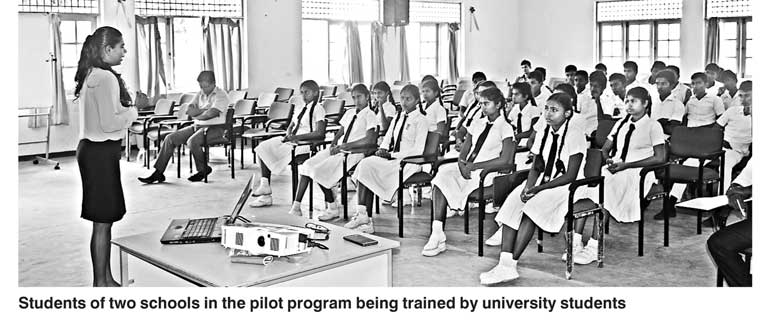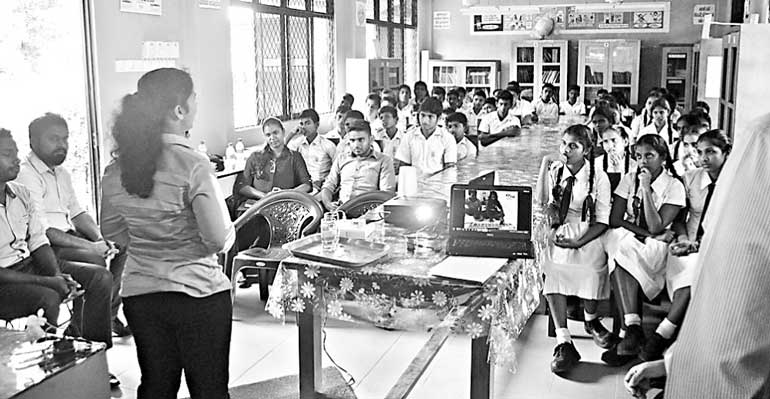Monday Feb 23, 2026
Monday Feb 23, 2026
Saturday, 23 December 2017 00:55 - - {{hitsCtrl.values.hits}}


Commercial Bank of Ceylon has announced the adoption of vocational training for school leavers as the next community cause it will champion on a national scale, in a logical progression of its commitments to computer literacy and online education.
Recognising the need to provide viable employment options to the many thousands of students that do not progress to higher education in Sri Lanka each year, as well as the growing dearth of trained artisans in the labour force, the bank will work with the Ministry of Education and private sector partners to advocate the dignity of skilled labour and provide opportunities for training and placement.
In pursuance of this, the CSR Trust of Commercial Bank has already launched a pilot vocational training program in six schools in collaboration with the Department of Technical Education and Training (DTET). The bank has established Career Guidance Units in the six schools to advise and guide students in grades 10 and 11 and also to students in the advanced level technical stream o understand the importance and benefits of acquiring a vocational skill.
The program will also address the stigma attached to selecting an occupation that involves a skill through seminars and other activities that promote awareness, the bank said.
This is an effort not only to widen the career opportunities available for students who do not succeed at the GCE Ordinary or Advanced level examinations, but also to help mitigate the crippling labour shortage prevalent in the job market especially in the construction industry, despite unemployment rates in the country standing at 4.5% at the close of 2016, the bank added.
Commenting on the launch of this program, Commercial Bank Managing Director Jegan Durairatnam said: “Increasingly, students that do not qualify for tertiary or higher education seem to be taking up jobs in the unskilled labour market or selecting vocations that are below their potential. This situation does not help them or the country, especially in the context of macro level productivity.”
He said many young Sri Lankans choose low-paying office jobs over better remunerated opportunities in masonry, carpentry, plumbing and welding. “We will try to change this through this vocational training programme, and help create a body of skilled workers ready to take on the construction industry which is in dire need of skilled construction technicians,” Durairatnam said.
The Ministry of Education has granted Commercial Bank permission to set up Career Guidance Units in the six schools chosen for the pilot program and students interested in vocational training will be taken on visits to technical colleges where they can learn about the study programmes and potential employment opportunities upon completion.
The responsibility of these schools, along with the teachers in charge of the Career Guidance Units is primarily to guide students who have middle to low potential of being successful at GCE Ordinary Level examination into vocational training.
The schools chosen for the pilot program are Divulankadawala Maha Vidyalaya, Hingurakgoda; Siddhartha M.V. Anuradhapura; Vidyadarshi Maha Vidyalaya, Nochchiyagama; CWW Kannangara Central College – Mathugama, DS Senanayake Central College, Kurunegala; and Parakum Maha Vidyalaya, Vavuniya. The bank said it expects to set up similar Career Guidance Units at more schools in the next three to five years.
Students from these schools will be introduced to vocational training programs conducted at affiliated Technical Colleges and Colleges of Technology in Anuradhapura, Kalutara, Kurunegala, Polonnaruwa and Vavuniya.
The Bank’s online educational portal ‘Sipnena’ will also play a key role in this with content specifically developed for vocational training.
Additionally, the Bank has appointed third year undergraduates in the Service Learning Group at the University of Colombo to visit the six schools and provide information on available training programs.
As an extension of this pilot vocational training programme, Access Engineering PLC has entered into a memorandum of understanding with the Commercial Bank to provide assistance to students who select courses on masonry, carpentry, welding, electricity and air conditioning conducted by DTET.
Under this agreement, Access Engineering will afford a fair opportunity to student candidates from the selected six schools to join the work force of its organisation, should they successfully complete courses at the DTET. The company will also permit Headstart Ltd., the company that owns the Guru.lk online learning portal and a partner to Commercial Bank’s own online educational portal Sipnena, to create motivational videos for students shot at Access Engineering sites.
As a result of this collaboration, students will stand a chance of being recruited by Access Engineering at a starting salary of approximately Rs. 40,000, the bank said.
As part of the program, the bank’s CSR Trust also hopes to improve the occupational English literacy of those who seek foreign employment, enabling them to earn a higher remuneration. Headstart Ltd. will develop an occupational English learning mobile application to help interested parties master specific vocabulary.
Sri Lanka was left with a massive reconstruction task at the end of the conflict in 2009 and consequently annual investments in new homes, roads and ports hovered at around Rs. 600 billion ($ 4 billion) in recent years. In 2017, this expenditure is expected to triple up to $ 11.6 billion. This situation calls for about 400,000 new construction workers.
However, the push to recruit skilled construction technicians from Sri Lanka for this sector has suffered due to a cultural stigma surrounding blue-collar labour. The vocational training programme could help bridge this gap and create skilled employees locally, the bank said.
The CSR Trust of the Commercial Bank has donated IT labs to 175 needy schools across Sri Lanka under one of its flagship community initiatives. The Trust’s education-related community projects also include its involvement in the Smart Schools Project that has enabled digital learning in 65 schools in the Western province.
Commercial Bank operates a network of 259 branches and 722 ATMs in Sri Lanka. The bank has won more than 30 international and local awards in 2016 and 2017 and has over the years received multiple awards as Sri Lanka’s Best Bank, Best Trade Bank, Strongest Bank and Most Respected Bank from a number of local and international institutions and publications.
Commercial Bank’s overseas operations encompass Bangladesh, where the bank operates 19 outlets, Myanmar, where it has a Representative Office in Yangon, the Maldives, where the bank has a fully-fledged Tier I Bank with a majority stake and Italy, where the bank operates its own money transfer service.